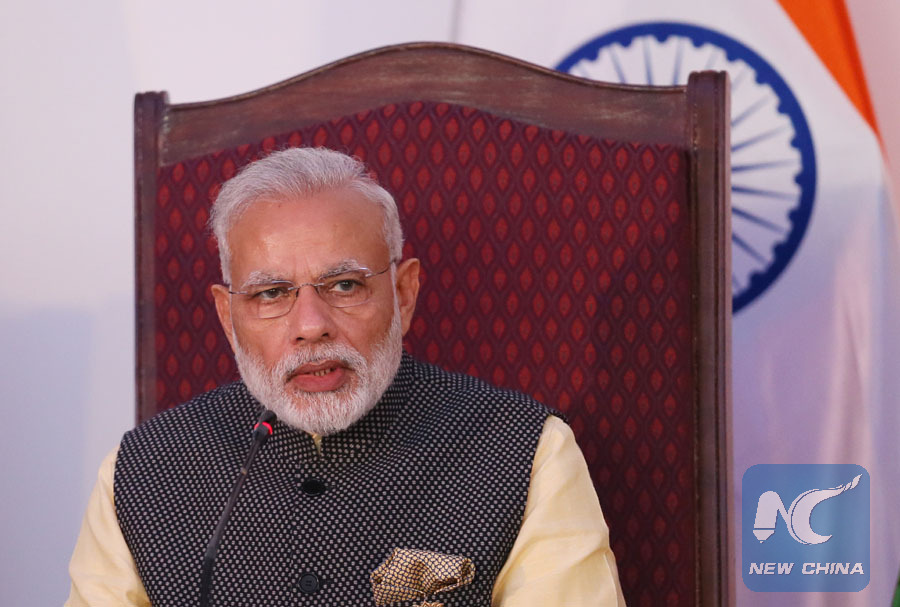Modi's balancing act in Davos
- By Sumantra Maitra
 0 Comment(s)
0 Comment(s) Print
Print E-mail China.org.cn, January 29, 2018
E-mail China.org.cn, January 29, 2018

Indian PM Narendra Modi tried hard to mellow down his hard-nationalist persona attempting to show his liberal side in his first ever speech at Davos, and the first for an Indian PM in more than 20 years. In his keynote address at the plenary session, PM Modi spoke about the issues of global warming, globalization and terrorism. The fundamental aim was to portray India as ready for investment and business.
Modi started by providing background, saying that the last time any Indian PM was in Davos, India's GDP was US$400 billion, now it is six times larger. In a showcase of business CEOs that accompanied the Indian delegation, the single disciplined message was that India is ready for business, and India is the prime center for investment.
The deliberate highlight of liberal principles was crucial in understanding Modi's pitch. In a way, India tried to follow China's lead in last year's WEF, saying that multinationalism is important. Modi highlighted three major challenges to global politics, and they were "climate change, terrorism and a threat to globalization with powers of protectionism rising." While terrorism is a hard power issue, climate change and protectionism are two issues which are unusual for a leader who rose to power focusing on nationalist imagery.
Modi's bid against protectionism also comes at an important time, when the U.S. is taking up the protectionist mantle, and Donald Trump is set to speak at Davos on the last day. While India and the United States are allies in areas of Intel cooperation against terrorism, this shows a significant area where the two diverge. And it will continue to grow. On January 22, the Trump administration slapped tariffs on fridges and solar products. In an essence, this is going to be India's balancing act, vis-à-vis the U.S. and China, as China supports more free movement of goods and the U.S. turns more protectionist.
The Indian pitch of liberal institutionalism is carefully calculated. Modi mentioned how terrorism is the biggest geopolitical threat, a hint to China that India is not willing to carry on any geopolitical rivalry, and is willing to share Intel with all the other great powers. It is also a pitch at multilateral cooperation on the international level by the one single threat every great power faces across the planet, one of Islamic jihadism.
His pitch of the world as one family takes its roots from the Gandhian philosophy and his espousing that India is a democracy and open to business, "no red tape, but red carpet," is another reflection that India only aspires to trade relations with the world, and has no interest in geopolitics.
That said, despite the big words, India faces three distinct challenges. First, India's aspiration doesn't match its capabilities. India's foreign service corps is one tenth of any other major power, and there's no centralized effort to make it any better. As a result, India's lobby power is weak, and despite this grandiloquent rhetoric at summits, there are no follow throughs.
Second, Indian society and government structure doesn't allow any centralized effort. As India is a federal structured polity, states have irresponsibly high power over the center. The progress is therefore asymmetric. States which are opposed to the center will stop all land acquisition and development and the center is powerless to do anything against it. Projects were cancelled in the past, because of state activism. That's unlikely to change in the future. The Indian political system lacks the requisite discipline that is needed for a country which wants to plan rapid development.
Finally, the Modi government has been influential in increasing the power of Hindu far right groups. That is a major cause of concern in countries, which want to invest in India. Recently, there have been major reports covering the increasing far right rhetoric in India, and even as the Indian center and states remain strong and secular, this is a worrying development. Indian cities are also crime infested, and the lack of independent policing and bad law and order is detrimental to any significant development.
That said, India's commitment to open trade is praiseworthy and important in this era of growing protectionism. One can only hope that isn't just rhetoric.
Sumantra Maitra is a columnist with China.org.cn. For more information please visit:
http://www.china.org.cn/opinion/SumantraMaitra.htm
Opinion articles reflect the views of their authors only, not necessarily those of China.org.cn.






Go to Forum >>0 Comment(s)